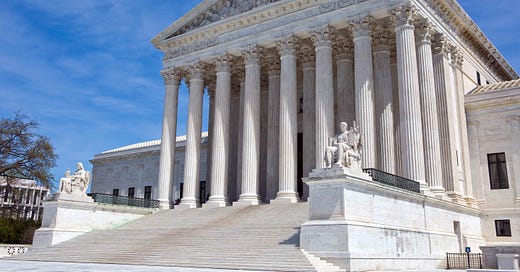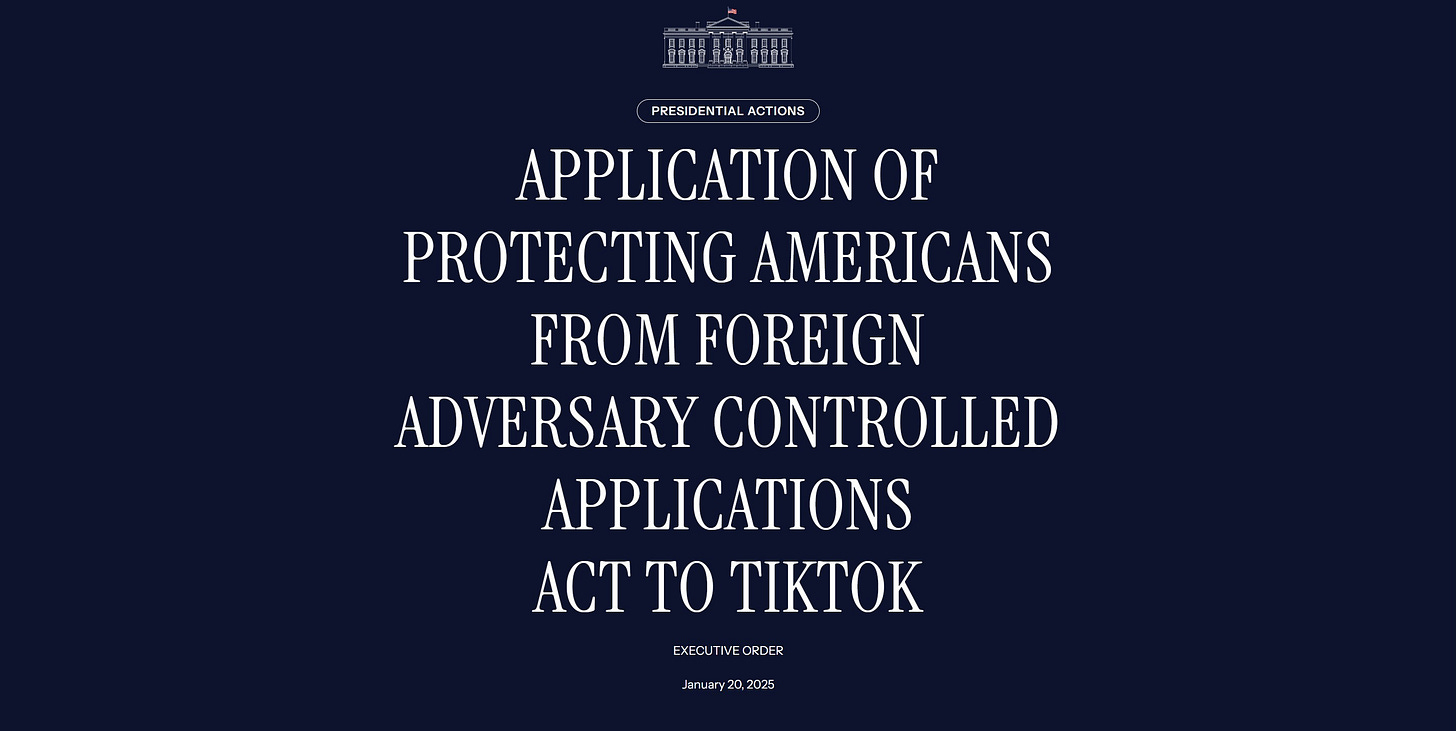The Canary in the Courthouse
Trump defies the Supreme Court in the TikTok case and nobody seems to care
The United States is now officially an authoritarian oligarchy. President Trump’s action to defy the Supreme Court’s decision to uphold a ban against TikTok in the United States is especially troubling. With everything else Trump has unleashed since January 20, focusing on the fate of a social media app may seem trivial. But bear with me.
In Trump’s first week in office, he used his black SharpieTM to issue a number of dictatorial decrees, in the form of memoranda, proclamations and executive orders. These decrees touch on multiple aspects of American life, including, but not limited to, citizenship, immigration, energy and the environment, national security, gender identity, DEI initiatives, tariffs and trade, federal workforce management, foreign aid, public health, and even geography.
But his directive to “unban” Tik Tok should especially give us pause. Why? Because the Supreme Court issued a decision upholding a law banning the Chinese-owned app in the United States, unless and until its corporate owner, ByteDance, severs its ties to its U.S. subsidiary.
And yet, with a flick of the pen, Trump ordered the Attorney General not to enforce the law, giving the Administration 75 days “to determine the appropriate course forward.”
Let that sink in.
The Supreme Court, which has the power to declare whether or not a law is constitutional, issued a decision, the basis of which in this case was that the law in question — “The Protecting Americans from Foreign Adversary Controlled Applications Act” — is, in fact, constitutional, and that under the provisions of the law, TikTok should be banned in the United States “unless U.S. operation of the platform is severed from Chinese control.” (The petitioners had argued that banning the app violated their right to freedom of expression under the First Amendment of the U.S. Constitution, an argument the Court rejected.)
Then the President, deciding he didn’t like the Court’s decision, simply undid it.
On Sunday, January 19, 2025 — the date the ban was to take effect — U.S. TikTok users who opened the app were treated to two consecutive messages about the ban, both aggrandizing President Trump (before he was even sworn in as president) and thanking him for supporting TikTok.
The next day, Shou Chew, the CEO of TikTok, was on the inauguration platform, standing behind Trump along with other oligarchs including Jeff Bezos (Amazon), Tim Cook (Apple), Elon Musk (Tesla et al.), Sundar Pichai (Google) and Mark Zuckerberg (Meta), among others.
I’m no constitutional scholar, but it seems pretty basic that once the Supreme Court issues a decision, it can only be overturned by a new Supreme Court decision, or by Congress passing a new law that effectively nullifies the law upheld by the decision. In this case, neither of those things occurred — and that strikes me as particularly dangerous.
Does this mean that, going forward, if the president doesn’t agree with a Supreme Court decision, he can issue an order that overturns it? Or simply ignore the decision? If so, what is the mechanism to hold him accountable? I think we already know the answer. (And by the way, I’m not exactly holding my breath to see what happens to TikTok at the end of the government’s 75-day review period.)
Finally, keep in mind that back in 2020, then-President Trump issued an executive order critical of TikTok which sought to ban certain transactions involving ByteDance or its subsidiaries. Federal courts enjoined the Commerce Department’s subsequent published list of prohibitions against ByteDance, at which point Trump ordered ByteDance to divest itself of all of its U.S. interests related to the operation of TikTok in the United States. (ByteDance and TikTok sued, there were negotiations with the Biden administration, but no agreement was ever reached. Congress then enacted the law that was the subject of the Supreme Court case.)
Both Trump’s 2020 executive order, and the recent law upheld by the Supreme Court, were based on the premise that TikTok poses a security risk to its U.S. users and, by extension, to the national security of the United States.
Apart from what this series of events says about the encroaching powers of the unitary executive and the survival of an independent judiciary, it also poses another serious question: what caused Trump’s about-face regarding TikTok? Why did Trump once care about the purported national security threat posed by a Chinese-owned social media app that captures personal data from millions of U.S. users, but now thinks it’s just fine? Only his bitcoins and bank accounts know for sure.








As much as I thought banning TikTok was judicial overreach, you make an excellent point. As yet another test case for the rule of law in the U.S., this is an abject failure.